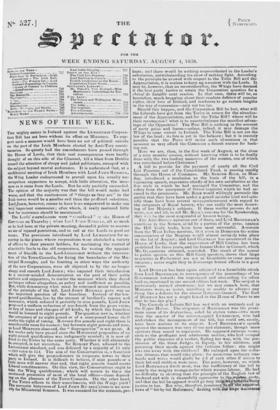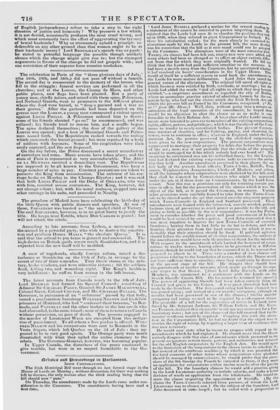NEWS OF THE WEEK.
THE mighty outcry in Ireland against the LYNDHURST Corpora- tion Bill has not been without its effect on Ministers. To sup- port such a measure would have been an act of political suicide on the part of the Irish Members elected by Anti-Tory consti- tuencies. So quietly had the amendments been passed through the House of Lords, that their real consequences were hardly thought of on this side of the Channel, till a blast from Dublin roused the attention of sleepy and jaded politicians, ennuyed with
the Whig Leader endeavoured to prevail upon his usually un-
scrupulous supporters to accept, with little alteration, the mea- sure as it came from the Lords. But he only partially succeeded.
The opinion of the majority was that the bill would make bad worse, and that the continuance of " things as they are" in the Irish towns would be a smaller evil than the proffered substitute.
LoraiooN, however, seems to have bsen empowered to make one ietj important concession ; after which, it really mattered little how far resistance should be maintained.
The Lords' amendments were "considered'' in the House of Commons on Thursday ; when Lord Jette Res*. LL, all so meek as be had been at the private meeting, deemed it politic to assume
an air of injured patriotism, and to rail at the Lords in good set terms. The provisions introduced by Lord LYNDHURST for se-
curing in the places where corporations were abolished a variety of offices to their present holders, for continuing the control of charitable funds to the old corporators, for vesting the appoint- ment of Sheriff's in the Lord-Lieutenant without the interven-
tion of the Town-Councils, for fixing the boundaries of the Mu- nicipal Boroughs, and for limiting in other ways the authority
of the new Corporations, were all objected to by the no longer
sleepy and smooth Lord JOHN; who imputed their introduction to a narrow-minded determination on the part of their noble
authors and supporters, to render the measure which they dared no longer refuse altogether, as paltry and inefficient as possible. But, while denouncing what must be esteemed minor infractions
of the principle of the bill, Lord JOHN RUSSELL gave way on the important question of the franchise. Instead of the ten- pound qualification, less by the amount of landlord's repairs and insurance, which reduced it probably to nine pounds, Lord JOHN proposed a uniform reduction of one-fourth from the gross value, in lieu of taxes and charges of all kinds, by which the franchise
would be lowered to eight pounds. The question now is, whether the occupancy of an eight-pound or of a irate-pound house shall confer the right of voting. Between five pounds and eight there is considerable room for contest; but between eight pounds and nine,
as Lord MORPETH observed, the " disproportion " is not great. A few weeks only have passed since the Ministerial proposition of an
eight-pound qualiffiation was indignantly scouted ; it is now of-
fered to the Tories by the same party. Whether it will ultimately beaccepted, is yet uncertain. Sir ROBERT PEEL adhered to the LYNDHURST standard, and was defeated by a majority of 15 only
—169 votes to 154. The aim of the Conservatives is, a franchise which will give the preponderance in corporate towns to their party in Ireland. It is difficult to believe, if nine pounds or a little more will answer that end, that eight pounds would create Liberal constituencies. On this view, the Conservatives ought to take the Whig qualification ; which will secure to them the continued possession of most of the local offices—those depend- ing on the pleasure of the Town-Councils. On the other hand, if the Tories adhere to their amendments, will the Whigs yield? The sarcastic bitterness of Lord Jotter Ru-sELL's tone is no secu- rity for Ministerial firmness, It was assumed for the occasion, per-
haps; and there would be nothing unprecedented in the Leader's submission, notwithstanding his show of making fight. According to the principle he avowed with respect to the Tithe Bill and the Appropriation, it is useless to keep up a contest with the Lords. It may be, however, that on reconsideration, the Whigs have deemed it the best party tactics to retain the Corporation question for a cheval de bataille next session. In that case, there will be, as heretofore, much bragging about their resolute defeinie of popular rights, their love of Ireland, and readiness to go certain lengths in the way of concession—only not too far.
Should this happen, and the Corporation Bill be lost, what will the Liberals have got from the Tories in return for the abandon- ment of the Appropriation, and for the Tithe Bill? where will be their recompense? what is to counterbalance the manifest advan- tage of the Opposition? The Poor Bill is nothing in the account of party gains and losses—unless, indeed, it tiny damage the Whigs to some extent in Ireland. The Tithe Bill is not yet the law of the land; its fate is yet in the balance ; but it is scarcely possible that the Peers will make such alterations in that measure as may afford the Commons a decent excuse for back- ing out. Here we are, then, in the first week of August, at the close of a nine months' session, without knowing what is to be finally done with the two leading measures of the session, one of which was introduced before Christmas
A bill to provide for the payment of nearly all the Civil List Pensions out of the Consolidated Fund, is passing rapidly through the House of Commons. Mr. SPRING Rica, on Mon- day, introduced a resolution as the basis of the bill, in a vapouring speech, expressive chiefly of his own satisfaction at the fine style in which he had managed the Committee, and the safety from the annoyance of future inquiries which he had se- cured to the pensioners. Mr. Rios would willingly persuade the public that they have been under a grand mistake (and undoubt- edly there have been several misapprehensions) with regard to the recipients of Royal bounty, who are really the moste'deserv- ing of her Majesty's subjects. If these worthy persons du not unite, oee and all, to aid Mr. Reca's canvass for the Speakership, they wel ,be the most ungrateful of human beings.
The Anti-Slavery agitation out of doors, and leerd BROUGHAM'S The Anti-Slavery agitation out of doors, and leerd BROUGHAM'S exertions in the Senate, aided by a portion of the press, against the Hill Cooly trade, have been most successful. Accounts from the West Indies mention, thst even in Demerara the entire emancipation of the Negroes would almost certainly take place on the 1st of August ; and Lord GLF,NELG has announced in the House of Lords, that the exportation of Hill Coolies has been prohibited for three years, and the famous Order in Council, which Mr. Gt./el:ism:4z obtained, rescinded. The result of the appeal to public opinion on this Hill Cooly question, shows that large majorities in Parliament are nut so formidable ns some persons imagine; never ought they to discourage honest efforts in a good cause.
Lord Duet' AM has been again subjected to a formidable attack from Lord BROUGHAM, in consequence of the proceedings of his Government towards the imprisoeed and absconding Ca iadian leaders, mentioned in our second edition last week. The subject is particularly noticed elsewhere ; but we may remark here, that Ministers were, as usual, unwilline or unable to advance any thing like a defence for the absent Governor-General. The Earl of DURHAM has not a single friend in the House of Peers to see that he has fair play !
The Custody of Infants Bill has met with an untimely cud in
the Upper House. The eliepieuce of BROUGHAM was the proxi- mate cause of its destruction, aide,' by eleven votes—two more than the muster of the silver-tongued Lvennuesr, who had undertaken the management of the bill, but could net, surely, have been zealous in its support. Lord BROUGHAM'S speech against the measure was very clever and elaborate, though inure specious than sound in argument. Ile supposed extreme coses; such as the profligate and adulterous mother, who had escaped the public exposure of a verdict, finding her way, with the per- mission of the three Judges in Equity, to her children, and poisoning their minds against the virtuous father: she might also run away with the children ! He enlarged upon the collu- sive divorces that would take place ; for numerous unhappy hus- bands and wives would gladly be rid of each other if access to their beloved children were easy. The point, however, on which Lord BROUGHAM dwelt most, was the inefficiency of the bill to reme ly the weighty wrongs under which women labour. Ile had no ditlieulty in showing that the principle of the English law of
husband and wife is shamefully oppressive to thseev e.6 party, and that the bill lie opposed would go very lift ea . al.dieleing
iit justice to her. But why, therepre, (contrarstlb alf` *e approved saws of " bit-by-bit Reformers, dealing with huge nuisance! of English jurisprudence,) refuse to take a step in the rieht direction of justice and humanity ? Why preserve a law which, it is not denied, occasionally produces the most cruel wrong, and which must constantly have the effect of aggravating the tyranny of brutal husbands? Why so strenuously uphold a principle in- defensible on any other ground than that women ought to be at their husbands' mercy ? Lord BROUGHAM'S speech was exparte: he stated in powerful language the possible though unlikely abuses which the change might give rise to; but the strongest arguments in favour of the change he did not grapple with; and our conviction of their superior force remains unshaken.



























